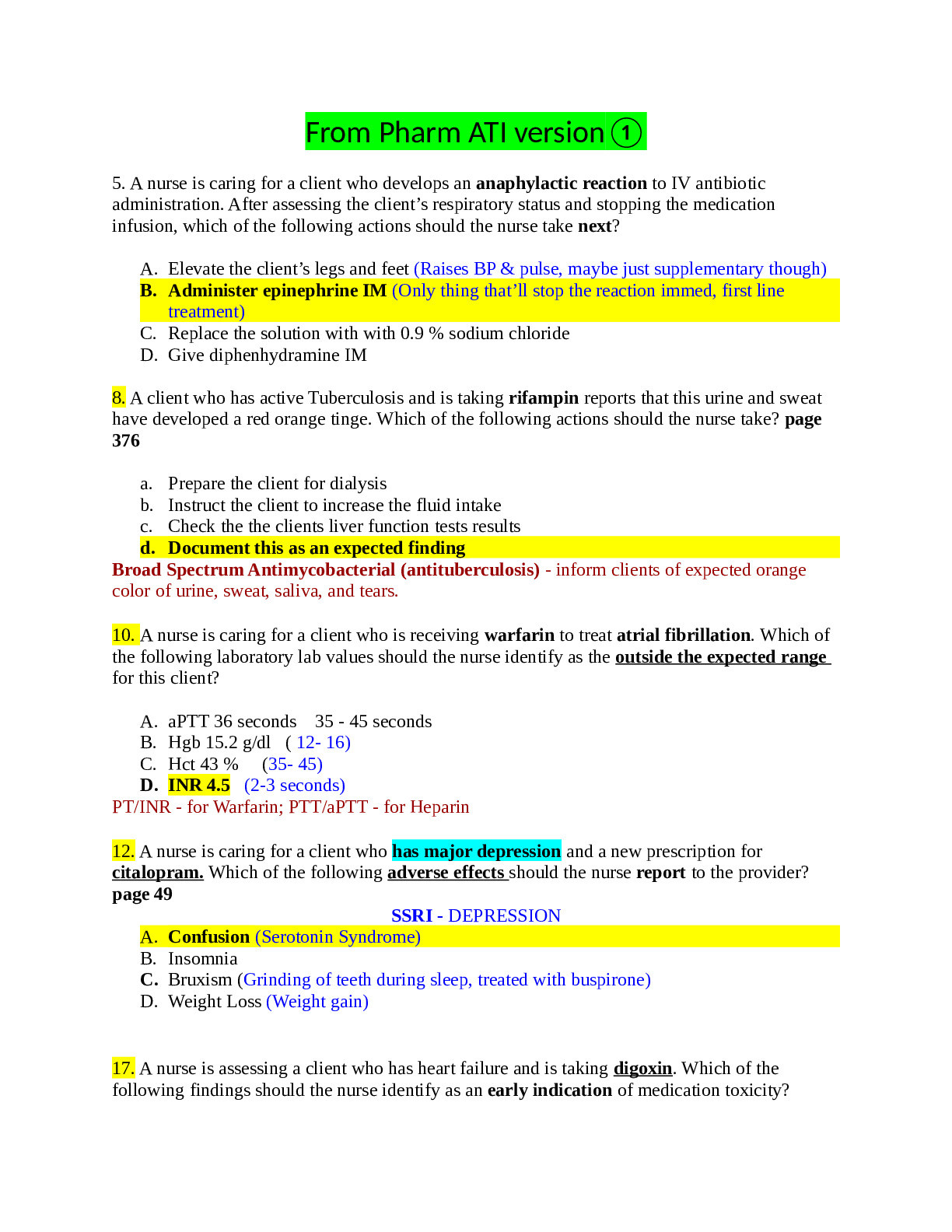5. A nurse is caring for a client who develops an anaphylactic reaction to IV antibiotic administration. After assessing the client’s respiratory status and stopping the medication infusion, which of the following actions should the nurse take next? A. Elevate the client’s legs and feet (Raises BP & pulse, maybe just supplementary though) B. Administer epinephrine IM (Only thing that’ll stop
...[Show More]
5. A nurse is caring for a client who develops an anaphylactic reaction to IV antibiotic administration. After assessing the client’s respiratory status and stopping the medication infusion, which of the following actions should the nurse take next? A. Elevate the client’s legs and feet (Raises BP & pulse, maybe just supplementary though) B. Administer epinephrine IM (Only thing that’ll stop the reaction immed, first line treatment) C. Replace the solution with with 0.9 % sodium chloride D. Give diphenhydramine IM 8. A client who has active Tuberculosis and is taking rifampin reports that this urine and sweat have developed a red orange tinge. Which of the following actions should the nurse take? page 376 a. Prepare the client for dialysis b. Instruct the client to increase the fluid intake c. Check the the clients liver function tests results d. Document this as an expected finding Broad Spectrum Antimycobacterial (antituberculosis) - inform clients of expected orange color of urine, sweat, saliva, and tears. 10. A nurse is caring for a client who is receiving warfarin to treat atrial fibrillation. Which of the following laboratory lab values should the nurse identify as the outside the expected range for this client? A. aPTT 36 seconds 35 - 45 seconds B. Hgb 15.2 g/dl ( 12- 16) C. Hct 43 % (35- 45) D. INR 4.5 (2-3 seconds) PT/INR - for Warfarin; PTT/aPTT - for Heparin 12. A nurse is caring for a client who has major depression and a new prescription for citalopram. Which of the following adverse effects should the nurse report to the provider? page 49 SSRI - DEPRESSION A. Confusion (Serotonin Syndrome) B. Insomnia C. Bruxism (Grinding of teeth during sleep, treated with buspirone) D. Weight Loss (Weight gain) 17. A nurse is assessing a client who has heart failure and is taking digoxin. Which of the following findings should the nurse identify as an early indication of medication toxicity?
a. Visual disturbances - (toxicity: fatigue, weakness, vision changes, GI effects) b. Insomnia - i don’t think this is relevant. LOL c. Potassium 4.4 mEq/L - within normal limits d. Sudden weight gain - GI effects (anorexia, N/V, abd pain) 20.) A nurse is caring for a client who is receiving IV amphotericin B. Which of the following findings should the nurse identify as an acute infusion reaction? a. Dry cough b. Fever - infusion reaction: fever, chills, rigor c. Pedal edema Hyperglycemia 21. A nurse is providing teaching to a client who has a new prescription for bumetanide for heart failure. Which of the following instructions should the nurse include in the teaching? a. You should monitor for hearing difficulties - ototoxicity is an AE of bumetanide/loop diuretic b. You should take this medication on an empty stomach - may cause GI stress c. You should take the medication at bedtime - avoid administering late in the day or at night to prevent nocturia d. You should decrease your intake of foods high in potassium -INC intake of potassium to prevent hypokalemia 30. A nurse is teaching a client who has prescription for ferrous gluconate. Which of the following statements by the clients indicates an understanding of the teaching a. I should stay upright for at least 15 minutes after medication b. I should notify the provider if my stools turn black (Harmless dark green/black stool) c. I should take this medication with 8 ounces of milk (DEC absorption) I should take an antacid with this medication to prevent stomach upset (Acid INC 34. A nurse is assessing a client who takes levothyroxine for ⇩⇩hypothyroidism.⇩⇩ The nurse should identify that which of the following findings indicates the need for an increase in dosage? SELECT ALL THAT APPLY. a. Impaired short term memory b. BP 178/80 c. Cold intolerance d. Heart rate 46 e. Diaphoresis 36. A nurse is caring for a client who has heart failure and is taking digoxin and hydrochlorothiazide. The nurse should monitor for which of the following following adverse effects of hydrochlorothiazide
[Show Less]
